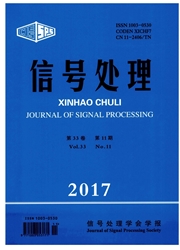

 中文摘要:
中文摘要:
现有的利用DOA分选跳频信号的方法大多使用规范的阵列流型,对天线的布局和通道的一致性要求较高,不能适用于机动灵活的应用场景。针对以上问题,本文在随机布局的多天线系统下利用稀疏贝叶斯学习算法对接收信号进行稀疏重构,根据稀疏权值向量估计跳频信号个数、载波频率以及各信号相对于多天线系统的时延向量,利用一种改进的K-means聚类算法对不同空域位置的跳频信号进行分选。仿真结果证明,本文提出的方法相比于已有的分选方法能够更加准确地完成参数估计和信号分选。
 英文摘要:
英文摘要:
The DOA-based sorting methods of frequency hopping signals mostly utilized arrays with standard geometry, which presented higher requirement for antenna layout and channel conformance, therefore cannot be suitable for flexible application. To solve these problems, a novel method based on Sparse Bayesian Learning algorithm in randomly distributed antenna system was proposed to complete the sparse reconstruction of received signals. According to the reconstruction re- sult the number of frequency hopping signals, cartier frequency and time-delay vector can be calculated based on the matc- hing algorithom and selective vector. Considering of the fact that different hops of one frequency hopping signal possessed the same time-delay vectors, an improved K-means clustering algorithm which can accelerate the calculation speed and en- hance the convergence accuracy was utilized to sort the frequency hopping signals from different locations. Numerical exam- ples demonstrate that the proposed method can estimate carrier frequency, cluster the time-delay vectors and sort the fre- quency hopping signals more accurately and effectively than existed methods based on Particle Filter algorithm.
 同期刊论文项目
同期刊论文项目
 同项目期刊论文
同项目期刊论文
 期刊信息
期刊信息
